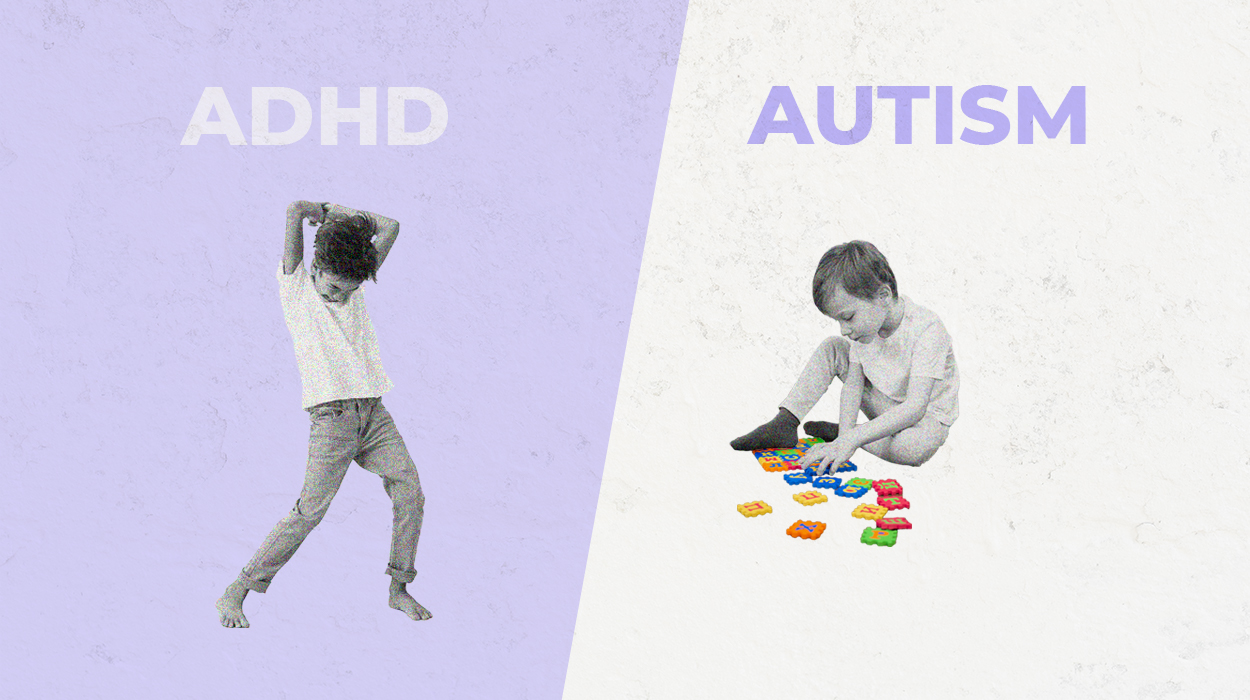 Expert's opinion
Expert's opinion
Expert's opinion
The article is a subjective view on this topic written by writers specializing in medical writing.
It may reflect on a personal journey surrounding struggles with an illness or medical condition, involve product comparisons, diet considerations, or other health-related opinions.
Although the view is entirely that of the writer, it is based on academic experiences and scientific research they have conducted; it is fact-checked by a team of degreed medical experts, and validated by sources attached to the article.
The numbers in parenthesis (1,2,3) will take you to clickable links to related scientific papers.
ADHD Vs Autism: Similarities, Differences, Causes & Treatment 2024

Attention deficit hyperactivity disorder (ADHD) is a lifelong condition that affects behavior and is commonly diagnosed in children. Similarly, Autism, which usually falls under the umbrella term Autism spectrum disorder (ASD), is a complex chronic disorder frequently appearing during childhood, affecting behavior and development.
Although ADHD and Autism are distinct mental health conditions that affect brain neurodevelopment, they can co-exist, showing similar symptoms, and are sometimes mistaken for each other.
Approximately 5% of the population worldwide[1] is reported to have ADHD. Studies estimate that two-thirds of these also have autistic features[2] and one-fifth co-diagnosed[3] with Autism spectrum disorder (ASD). In contrast, up to half of autistic individuals are also thought to exhibit ADHD symptoms.[4]
There is a great deal of research on ADHD and Autism independently, but there has been less understanding of how and why both conditions frequently occur together or show similar symptoms.
ADHD Vs Autism: A Close Comparison

ADHD is most evident during childhood when it is easier to spot initial signs like the inability to conform to conventional behavior at school. ADHD children can disrupt the classroom environment, making learning difficult for them and other children to learn.
Kids with ADHD traits can show extreme levels of inattention, hyperactivity, and impulsive behaviors. They may find trouble sitting still or have difficulty focusing their attention on particular tasks.
There are three main types of ADHD with particular dominance in either one kind or the other, or a combination of both. The inattentive type is easily distracted and disorganized, while the hyperactive type constantly moves, fidgets, or talks.
Although a mixture of both types is typical, hyperactivity[5] is the most common single ADHD symptom seen in preschool-age children.
Autism is a group of complex conditions in which autistic people vary in how they see, hear, and feel the world around them. About 1 in 68 children in the U.S.[6] are diagnosed with Autism.
Like everyone, those with Autism have their own merits and shortcomings but are often seen by the outside world as physically and emotionally distant, socially awkward, and unable to communicate effectively.
Similarities between ADHD and Autism
Since both ADHD and Autism can affect language, movement, concentration, and social skills, they may share similar features.
Sharing features during the early stages
In the early stages,[2] particularly in children, both conditions’ symptoms can be alike and sometimes easily mistaken. On occasion, some children cannot be clearly diagnosed as having one state and not the other or are misdiagnosed with each other, but ADHD and Autism are two distinct conditions.
Difficulty processing information
Not only individuals with ADHD may have difficulty organizing their thoughts and ability to learn new information, but those with an Autism diagnosis may also take longer[2] to process new data with much less accuracy than those without either condition.
Inability to stay still
ADHD sufferers are often hyperactive, fidget, and have trouble sitting still. Similarly, those with Autism may sometimes display specific movements that comfort them, such as rocking back and forth or twiddling their fingers. To some, these self-comforting ASD behaviors[2] may be seen as an inability to keep still.
Difficulty following instructions
Teachers may comment that children with ADHD or Autism don’t seem to listen as both may have trouble following directions or focusing on individual tasks, disrupting learning.
Have trouble relating to others’ attention
Those with ADHD and Autism may seem to be cold or can’t relate to other people’s emotions or feelings, making it challenging to maintain interpersonal relationships with others.
Diagnosis favoring boys

Studies show that boys are more than twice as likely[7] to be diagnosed with ADHD than girls. Similarly, boys are also more likely[6] to have ASD than girls. They also reveal that boys with ADHD tend to be more hyperactive, while girls can be more quietly inattentive, like daydreaming or hyper-talkative.
Because ADHD and Autism symptoms present differently[7] in boys and girls, this may explain why more boys are diagnosed than girls, simply because hyperactivity is a more easily recognizable sign of ADHD.
Differences Between ADHD and Autism
Despite both conditions sharing similar symptoms, they are two different developmental disorders.
Ability to focus
While those with Autism may lose concentration when doing tasks they don’t particularly like, they can show intense focus[6] and fixate on their special interests. Those with ADHD are easily distracted and generally dislike any task that requires attention to detail.
Communication
When it comes to social communication and social interactions, autistic people tend to be awkward with the inability to put thoughts and feelings together to communicate effectively and rarely make eye contact. Though on occasion[6], some with Autism can talk to great lengths but only about their particular interests.
In contrast, those with ADHD may have the “gift of the gab”, disrupting others mid-conversation and leading their own confidently.
Repetition
Individuals with Autism generally prefer order, do the same things repeatedly,[6] and dislike unpredictable changes. They find comfort in repetitive behaviors: having the same daily routine, eating the same food, or being severely attached to only one particular favorite toy. In comparison, those with ADHD can be disorganized, dislike repetition,[1] and often get bored fairly quickly.
Causes
Although research on the comorbidity of Autism and ADHD has increased over recent years, there is still much to learn about connecting the two conditions. Studies show genetics[8] possibly plays an essential role in the origins of both disorders.
Many studies further support this, revealing that family members[9] of individuals suffering from either ADHD or Autism frequently display symptoms of the other condition.
Diagnosis
Either an Autism or ADHD diagnosis doesn’t depend on a strict set of conditions or observations. Instead, doctors often ask for feedback and input from parents, teachers, or other carers to look for patterns of behaviors over time for a thorough evaluation.
Both Autism and DHD diagnoses are most likely done during childhood and often involve questionnaires, surveys, interviews, and observations.
Treatment
Starting proper ADHD and Autism treatment depends on receiving a correct diagnosis.
Because of the complexity and similarities between the two conditions, parents may opt to see a specialist in child behavior disorders over general pediatricians or medical practitioners.
Behavioral Therapy
Behavioral therapy is a broad term for different therapy types to treat mental health disorders by identifying and changing unhealthy or self-destructive behaviors. These don’t change symptoms but teach individuals how to cope with and control their thoughts and actions.
Younger children with ADHD may start with behavioral therapy; older kids will typically combine therapy with medication.
No cure exists for those with Autism, but there are many ways to help relieve symptoms and provide support to make life easier, such as speech therapy[6] to aid communication.
Medication
While those with ADHD symptoms respond well to medications like methylphenidate and amphetamine, they are generally less effective on Autism symptoms. Equally, autistic individuals with ADHD symptoms may find relief[10] from such medicines.
Because of the increase in the co-occurrence of those with ADHD and Autism, research has increased in trialing medication specifically to treat Autism symptoms. However, only a small number of medicines are formally approved to treat those with Autism and mainly only for treating irritability.[11]
Conclusion
Both ADHD and Autism are neurodevelopmental disorders that can impact emotions, behaviors, and the ability to learn and process new information. They are lifelong conditions that commonly occur with each other and are frequently diagnosed during childhood.
Similar features of both conditions sometimes lead to confusion over their diagnosis, but ADHD and Autism are distinct disorders with differences. Genetic factors may play a role in the comorbidity of two disorders ADHD and Autism, but more research is needed to understand this fully.
ADHD and Autism can both be managed with correct therapy and treatment adapted to each individual.
+ 11 sources
Health Canal avoids using tertiary references. We have strict sourcing guidelines and rely on peer-reviewed studies, academic researches from medical associations and institutions. To ensure the accuracy of articles in Health Canal, you can read more about the editorial process here
- Polanczyk, G.V., Andrade, M., Hallal, P.C., Biederman, J. and Luis Augusto Rohde (2007). The Worldwide Prevalence of ADHD: A Systematic Review and Metaregression Analysis. [online] 164(6), pp.942–948. doi:https://doi.org/10.1176/ajp.2007.164.6.942.
- Mulligan, A., Anney, R., O’Regan, M., Chen, W., Butler, L., Fitzgerald, M., Buitelaar, J.K., Hans-Christoph Steinhausen, Rothenberger, A., Minderaa, R.B., Nijmeijer, J.S., Hoekstra, P.J., Oades, R.D., Roeyers, H., Cathelijne J. M. Buschgens, Christiansen, H., Franke, B., Gabriëls, I., Hartman, C.A. and Kuntsi, J. (2008). Autism symptoms in Attention-Deficit/Hyperactivity Disorder: A Familial trait which Correlates with Conduct, Oppositional Defiant, Language and Motor Disorders. [online] 39(2), pp.197–209. doi:https://doi.org/10.1007/s10803-008-0621-3.
- Price, A., Tamsin Newlove-Delgado, Eke, H., Paul, M., Young, S., Ford, T. and Janssens, A. (2019). In transition with ADHD: the role of information, in facilitating or impeding young people’s transition into adult services. [online] 19(1). doi:https://doi.org/10.1186/s12888-019-2284-3.
- Lee, D.S. and Ousley, O.Y. (2006). Attention-Deficit Hyperactivity Disorder Symptoms in a Clinic Sample of Children and Adolescents with Pervasive Developmental Disorders. [online] 16(6), pp.737–746. doi:https://doi.org/10.1089/cap.2006.16.737.
- National Institute of Mental Health (NIMH). (2022). Attention-Deficit/Hyperactivity Disorder. [online] Available at: https://www.nimh.nih.gov/health/topics/attention-deficit-hyperactivity-disorder-adhd.
- Anon, (2023). Prevalence of Autism Spectrum Disorder Among Children Aged 8 Years — Autism and Developmental Disabilities Monitoring Network, 11 Sites, United States, 2010. [online] Available at: https://www.cdc.gov/mmwr/preview/mmwrhtml/ss6302a1.htm.
- Anon, (2023). FastStats – Attention Deficit Hyperactivity Disorder. [online] Available at: https://www.cdc.gov/nchs/fastats/adhd.htm.
- Franke, B., Neale, B.M. and Faraone, S.V. (2009). Genome-wide association studies in ADHD. [online] 126(1), pp.13–50. doi:https://doi.org/10.1007/s00439-009-0663-4.
- Nijmeijer, J.S., Hoekstra, P.J., Minderaa, R.B., Buitelaar, J.K., Altink, M.E., Cathelijne J. M. Buschgens, Fliers, E.A., Nanda Rommelse, Sergeant, J.A. and Hartman, C.A. (2008). PDD Symptoms in ADHD, an Independent Familial Trait? [online] 37(3), pp.443–453. doi:https://doi.org/10.1007/s10802-008-9282-0.
- Turner, M. (2020). The role of drugs in the treatment of autism. [online] 43(6), pp.185–190. doi:https://doi.org/10.18773/austprescr.2020.054.
- Davis, N.E. and Kollins, S.H. (2012). Treatment for Co-Occurring Attention Deficit/Hyperactivity Disorder and Autism Spectrum Disorder. [online] 9(3), pp.518–530. doi:https://doi.org/10.1007/s13311-012-0126-9.



